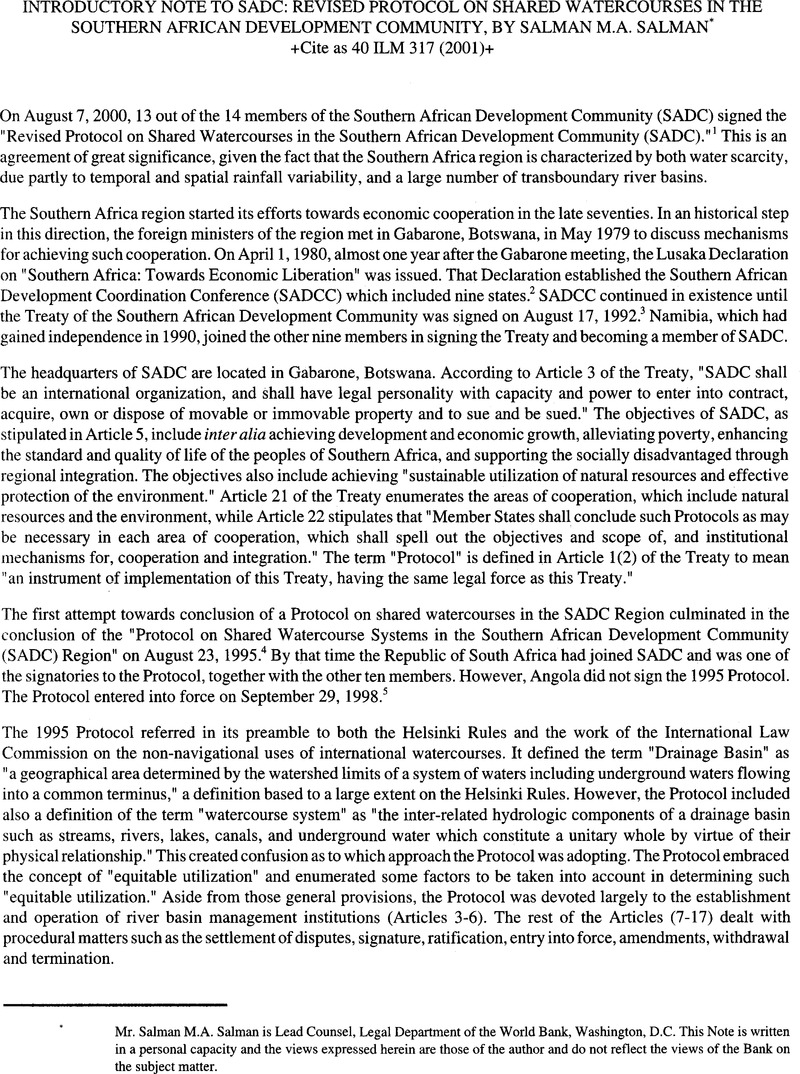Article contents
Southern African Development Community (SADC): Revised Protocol on Shared Watercourses in the Southern African Development Community*
Published online by Cambridge University Press: 27 February 2017
Abstract

- Type
- Treaties, Agreements and Related Documents
- Information
- Copyright
- Copyright © 2001
Footnotes
Mr. Salman M.A. Salman is Lead Counsel, Legal Department of the World Bank, Washington, D.C. This Note is written in a personal capacity and the views expressed herein are those of the author and do not reflect the views of the Bank on the subject matter.
Peter C. Hansen, Esq. is Editor of International Legal Materials at the American Society of International Law. This abstract originally appeared in the Society's International Law In Brief, which is archived at http://www.asil.org
References
Endnotes
* This document was reproduced and reformatted from the official text of the Protocol provided by Mr. Salman M.A. Salman, Lead Counsel with the Legal Department of the World Bank, Washington, D.C.
1 The members of SADC who signed the Protocol are Angola, Botswana, Lesotho, Malawi, Mauritius, Mozambique, Namibia, Seychelles, the Republic of South Africa, Swaziland, Tanzania, Zambia and Zimbabwe. At the time of preparation of this Note, the Democratic Republic of Congo has not signed the Protocol, being the only member of SADC who has not done so.
2 Those states were Angola, Botswana, Lesotho, Malawi, Mozambique, Swaziland, Tanzania, Zambia and Zimbabwe.
3 For the provisions of the Treaty, see 32 ILM 116 (1993). See also the Introductory Note to the Treaty by Rosalind H. Thomas.
4 The 1995 Protocol, as well as the Revised Protocol, use the term “shared” as opposed to the term “international” generally used in the Resolutions and Rules issued by the Institute of International Law, the International Law Association, and the United Nations Convention on the Law of the Non-Navigational Uses of International Watercourses, as well as the earlier drafts of the Convention prepared by the International Law Commission.
5 Article 10 of the 1995 Protocol stated that the Protocol would enter into force thirty days after the deposit of the instruments of ratification by two-thirds of the Member States of SADC. The actual date of entry into force of the 1995 Protocol — September 29, 1998 — is stated in Article 16(1) of the Revised Protocol.
6 The Convention was adopted by a vote of 103 for and 3 against (Burundi, China and Turkey) with 27 abstentions. See 36 ILM 700 (1997).
7 By the time the Revised Protocol was adopted, the membership of SADC had grown to fourteen members, from the original ten members who had signed the Treaty in 1992. The new members are the Republic of South Africa and the Democratic Republic of Congo, in addition to the two island states of Mauritius and Seychelles. The signature of the Protocol by those two island states is symbolic, and should be interpreted as endorsing the cooperative principles enunciated by the Revised Protocol.
8 Article 3(10)(a) and (b) of the Revised Protocol incorporates the same provisions of Article 7(1) and (2) of the UN Convention on the obligation not to cause significant harm. Moreover, paragraph (c) of the Protocol Article 10 is a reiteration of Article 32 of the UN Convention on “Non-discrimination.” Indeed, Article 32 deals with non-discrimination by a watercourse state, on the basis of nationality, against natural or juridical persons who have suffered significant transboundary harm as a result of activities related to an international watercourse by the watercourse state. Incorporating this article as part of the article of the Protocol dealing with the obligation not to cause harm is indeed interesting, and not without merit.
9 Paragraph 1 of both Articles state that in the absence of an agreement to the contrary, nothing in the UN Convention or the Protocol shall affect the rights and obligations of a watercourse state arising from agreements in force. A number of agreements have been concluded between the countries of the SADC Region on shared rivers there. Such agreements include the “Agreement on the Action Plan for the Environmentally Sound Management of the Common Zambezi River System” signed on May 28, 1987 by Botswana, Mozambique, Tanzania, Zambia and Zimbabwe. (See 27 ILM 1109 (1988)). Botswana, Mozambique, South Africa and Zimbabwe also signed an agreement on June 5, 1986 concerning the establishment of a Joint Technical Committee for the Limpopo Basin. South Africa and Mozambique signed an agreement on July 26, 1996 concerning the Establishment and Functioning of the Joint Water Commission. In addition, South Africa and Lesotho entered into a treaty on the Lesotho Highlands Project on October 24, 1986.
10 This difference is understandable given the fact that the UN Convention is a universal instrument that is not supposed to cater to the particularities of different river basins or interests of riparian states.
- 3
- Cited by


